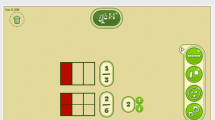Abstract
We describe a Wizard-of-Oz study that investigates the impact of different types of feedback on students’ affective states. Our results indicate the importance of matching carefully the affective state with appropriate feedback in order to help students transition into more positive states. For example when students were confused affect boosts and specific instruction seem to be effective in helping students to be in flow again. We discuss this and other effective ways to and implications for the development of our system and the field in general.
Access this chapter
Tax calculation will be finalised at checkout
Purchases are for personal use only
Preview
Unable to display preview. Download preview PDF.
Similar content being viewed by others
References
DMello, S.K., Lehman, B., Pekrun, R., Graesser, A.C.: Confusion can be beneficial for learning. Learning & Instruction 29(1), 153–170 (2014)
Baker, R.S.J.D., DMello, S.K., Rodrigo, M.T., Graesser, A.C.: Better to be frustrated than bored: The incidence, persistence, and impact of learners cognitive-affective states during interactions with three different computer-based learning environments. Int. J. Hum.-Comput. Stud. 68(4), 223–241 (2010)
Santos, O., Saneiro, M., Salmeron-Majadas, S., J.G., B.: A methodological approach to elicit affective educational recommendataions. In: IEEE 14th International Conference on Advanced Learning Technologies (2014)
Woolf, B., Burleson, W., Arroyo, I., Dragon, T., Cooper, D., Picard, R.: Affect-aware tutors: recognising and responding to student affect. Int. J. Learning Technology 4(3–4), 129–164 (2009)
Conati, C., MacLaren, H.: Empirically building and evaluating a probabilistic model of user affect. User Modeling and User-Adapted Interaction (2009)
Shen, L., Wang, M., Shen, R.: Affective e-learning: Using emotional data to improve learning in pervasive learning environment. Educational Technology & Society 12(2), 176–189 (2009)
DMello, S., Craig, S., Gholson, B., Franklin, S., Picard, R., Graesser, A.: Integrating affect sensors in an intelligent tutoring system. In: Affective Interactions: The Computer in the Affective Loop Workshop at 2005 International Conference on Intelligent User Interfaces, pp. 7–13 (2005)
Pekrun, R.: The control-value theory of achievement emotions: Assumptions, corollaries, and implications for educational research and practice. J. Edu. Psych. Rev., 315–341 (2006)
Porayska-Pomsta, K., Mavrikis, M., Pain, H.: Diagnosing and acting on student affect: the tutors perspective. UMUAI 18(1), 125–173 (2008)
Mavrikis, M., Grawemeyer, B., Hansen, A., Gutiérrez-Santos, S.: Exploring the potential of speech recognition to support problem solving and reflection. EC- TEL 2014, 263–276 (2014)
Ocumpaugh, J., Baker, R.S.J.d., Rodrigo, M.M.T.: Baker-Rodrigo Observation Method Protocol (BROMP) 1.0. Training Manual version 1.0. Tech. rep., New York, NY: EdLab. Manila, Philippines: Ateneo Laboratory for the Learning Sciences (2012)
Rosenthal, R., Rosnow, R.: Essentials of Behavioral Research: Methods and data analysis. McGraw Hill, 3rd edn. (2008)
Author information
Authors and Affiliations
Corresponding author
Editor information
Editors and Affiliations
Rights and permissions
Copyright information
© 2015 Springer International Publishing Switzerland
About this paper
Cite this paper
Grawemeyer, B., Mavrikis, M., Holmes, W., Hansen, A., Loibl, K., Gutiérrez-Santos, S. (2015). Affect Matters: Exploring the Impact of Feedback During Mathematical Tasks in an Exploratory Environment. In: Conati, C., Heffernan, N., Mitrovic, A., Verdejo, M. (eds) Artificial Intelligence in Education. AIED 2015. Lecture Notes in Computer Science(), vol 9112. Springer, Cham. https://doi.org/10.1007/978-3-319-19773-9_70
Download citation
DOI: https://doi.org/10.1007/978-3-319-19773-9_70
Published:
Publisher Name: Springer, Cham
Print ISBN: 978-3-319-19772-2
Online ISBN: 978-3-319-19773-9
eBook Packages: Computer ScienceComputer Science (R0)



